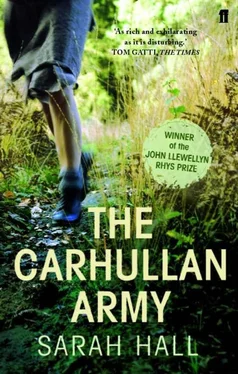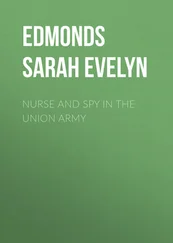Sarah Hall - The Carhullan Army
Здесь есть возможность читать онлайн «Sarah Hall - The Carhullan Army» весь текст электронной книги совершенно бесплатно (целиком полную версию без сокращений). В некоторых случаях можно слушать аудио, скачать через торрент в формате fb2 и присутствует краткое содержание. Год выпуска: 2008, Издательство: Faber and Faber, Жанр: Современная проза, на английском языке. Описание произведения, (предисловие) а так же отзывы посетителей доступны на портале библиотеки ЛибКат.
- Название:The Carhullan Army
- Автор:
- Издательство:Faber and Faber
- Жанр:
- Год:2008
- ISBN:нет данных
- Рейтинг книги:4 / 5. Голосов: 1
-
Избранное:Добавить в избранное
- Отзывы:
-
Ваша оценка:
- 80
- 1
- 2
- 3
- 4
- 5
The Carhullan Army: краткое содержание, описание и аннотация
Предлагаем к чтению аннотацию, описание, краткое содержание или предисловие (зависит от того, что написал сам автор книги «The Carhullan Army»). Если вы не нашли необходимую информацию о книге — напишите в комментариях, мы постараемся отыскать её.
The Carhullan Army — читать онлайн бесплатно полную книгу (весь текст) целиком
Ниже представлен текст книги, разбитый по страницам. Система сохранения места последней прочитанной страницы, позволяет с удобством читать онлайн бесплатно книгу «The Carhullan Army», без необходимости каждый раз заново искать на чём Вы остановились. Поставьте закладку, и сможете в любой момент перейти на страницу, на которой закончили чтение.
Интервал:
Закладка:
Among the locals, speculation about the lives they led was rife, and it was often cruel, or filled with titillation. They were nuns, religious freaks, communists, convicts. They were child-deserters, men-haters, cunt-lickers, or celibates. They were, just as they had been hundreds of years go, witches, up to no good in the sticks. A few years after they set up, the national papers got wind of the enterprise and Carhullan became moderately famous. Ambitious reporters made the pilgrimage up the mountain to interview the women.
It was one of the last working fell farms. And life there was hard. There were animals to deal with at the crack of dawn, there was lumber to shift, fields to crop. Some reports said the place was really a rustic health club, a centre for energetic meditation. As well as the agricultural efforts, there was other physical training; traditional sparring, eight-mile maintenance runs once a week. There were no men allowed, though some of the rumours said there were, and inferred what they were used for. The proprietors remained difficult to pin down on the subject.
Jackie Nixon ran Carhullan with her friend Veronique, a tall black woman from the American South. Jacks and Vee they were known as by the other girls. I had heard Veronique on the local radio station and she had the last hum of an accent, a soft drawl, when she talked. And it was mostly her who talked. She was the spokesperson, the one who gave interviews to the magazines and news crews. The place sounded utopian, martial or monastic, depending on which publication was interviewing, and what angle they wanted to push. Veronique’s other half was more reclusive.
The number of women grew each year, though no recruiting was ever done. There were some complaints from men, that their wives and daughters had been kidnapped, brainwashed, assimilated, and bent. There were police investigations, but no formal charges were ever brought. The girls who went there had simply opted out of their old lives. Each time I came across an article in the papers I would cut it out and keep it. I followed the progress of the farm, discarding the criticism, and searching through the text for a clue to its real spirit, its philosophy maybe, until the newspapers switched fully to issues of state, then downsized circulation, folded, and I heard nothing more about the place.
I don’t know what it was about Jackie Nixon that compelled me. Maybe it was because she was from my area, and that likened us. I felt I almost knew her. She was always depicted formidably; hard-cast, like granite. People in the region were wary even of her name, old as it was — stock of ironmongers, masons, and the bowmen of the North. In Rith it was issued like superstition from the mouths of those discussing her and her girls. ‘Jackie Nixon,’ they said. ‘She’s one of the Border Nixons. They were the ones who went out with bulldogs to meet the reivers.’ I watched for her at the market, but she never seemed to come down from the farm with the other women.
Before he died my father commented that it would take only a small twist of the dial for Jackie Nixon to become a menace to society. The more he spoke out against her, the more intrigued I became. I remember asking him across the kitchen table one morning what it was about her that he thought was so objectionable. ‘Don’t you think she’s some kind of heroine,’ I’d asked him, ‘like Graine Warrior? I mean, she lives up there completely independently. I’ve heard she doesn’t take any subsidies. The others must trust her to stay on. She must be an amazing person. I’d like to meet her.’ My father had raised his eyebrows high on his forehead. ‘I think she’s leaning on them lasses to do whatever she damn well wants, and she’s messing with their heads,’ he said, ‘like a cult bloody crackpot. And you, my girl, are to steer clear.’
I had two photographs of her. The first was from back when the project began. She was standing outside the heavy oak door of Carhullan with an arm around Vee; it was held awkwardly up across her friend’s shoulders because Veronique was much the taller of the two. The picture looked posed, agreed to, and as if the notion of what they were doing was a high-spirited challenge of some kind, like crossing the Atlantic in a coracle. The two of them were in their late twenties then and they looked full of vim and determination. The caption described them as partners and the article went on to speculate about whether or not they were lovers. They’d met at Cambridge University, it said, while completing postgraduate degrees; two like minds, two retro feminists. Before that Jackie had been in the military. Her rank was uncertain.
Jackie had tightly cropped hair, a lopsided face, and a broken jawline. Her eyes were the blue of the region’s quarried stone. If she’d had a softer appearance she would have been called bonny perhaps. As it was she was handsome, arresting. In the picture she was wearing a tank top and army surplus trousers. She looked both slim and stocky at once. The second photograph, taken five years later, had her turning away from the camera. Her hair was slightly longer, she was much leaner, and there was a deep frown on her face.
Both picture cuttings were tucked into a metal box of possessions in my backpack, with my identification card and a few other personal effects. They were faded and creased, but I had kept them. If she was still alive, it would be her I’d have to address when I reached my destination.
And I could feel it already, that I was entering her country, her domain. It was a raw landscape, verging on wilderness. The thick green vegetation overrunning the lowlands was now behind me. Rock was beginning to show through the grassland; the bones of an older district, stripped by the wind, washed clean by fast-flowing becks and rain. There was heather, bracken, and gorse.
As I walked upwards on the scars I thought about her. In the early reports Jackie had always been depicted as a typical Northerner; obdurate, reticent, backlit. She seldom went on the record about anything, personal or otherwise. When she did, it was curtly expressed. Anyone coming to the farm needed good shoes, she said — boots, trainers — books, and nothing else. They should get their wisdom teeth removed first. Rarer still, she spoke about her beliefs. ‘It’s still all about body and sexuality for us,’ she was once quoted as saying. ‘We are controlled through those things; psychologically, financially, eternally. We endorse the manmade competition between ourselves that disunites us, striping us of our true ability. We don’t believe we can govern better, and until we believe this, we never will. It’s time for a new society.’
When it was suggested that she might be offering an empty alternative, a formula that had already been unsuccessful, she directed scorn at the governing politicians, asking if the environment they were creating was acceptable. She was often asked what it was that she had in her, making her do what she was doing, as if she were somehow afflicted. Interviewers commented on her impatience, her furious suspension of the conversation if the wrong questions were asked.
Jackie and Veronique were given plenty of titles, called plenty of things by different people in the years of Carhullan’s publicity. But as they had it they were simply libertarians. As they had it, theirs was a culture moulded from necessity, formed, as Jackie described, to spean the lambs before they became sheep.
And Carhullan was Jackie’s idea, that much was apparent. Her family were from the area, so she knew it like none of the other women ever would, though they worked the land every day, moving sheep and cows, panting across the rough terrain to break the eight-mile hour. This was her home turf. Her territory. She had either bought the place outright or taken it over because it was lying empty. Already by then people were heading into the town, driven out of rural habitations by the transport problems and the steepening fuel prices. Farming was considered a dying industry.
Читать дальшеИнтервал:
Закладка:
Похожие книги на «The Carhullan Army»
Представляем Вашему вниманию похожие книги на «The Carhullan Army» списком для выбора. Мы отобрали схожую по названию и смыслу литературу в надежде предоставить читателям больше вариантов отыскать новые, интересные, ещё непрочитанные произведения.
Обсуждение, отзывы о книге «The Carhullan Army» и просто собственные мнения читателей. Оставьте ваши комментарии, напишите, что Вы думаете о произведении, его смысле или главных героях. Укажите что конкретно понравилось, а что нет, и почему Вы так считаете.












